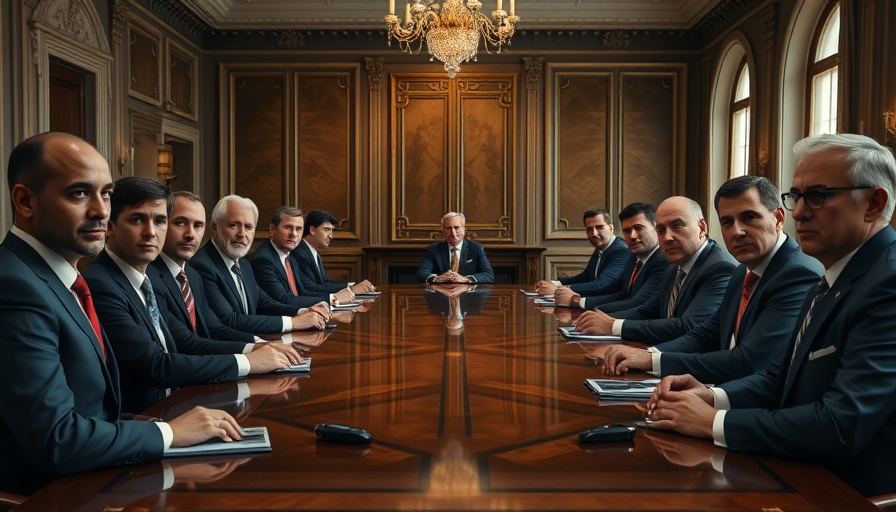
Critical Shift in U.S. Foreign Policy Towards Ukraine
In a surprising statement, U.S. Secretary of State Marco Rubio recently indicated that the United States may soon "move on" from attempts to mediate peace between Ukraine and Russia if tangible progress isn't made within days. As the ongoing conflict continues to dominate national and international headlines, Rubio's remarks raise significant questions about the future of U.S. involvement in this pivotal geopolitical issue.
The Stakes of Ukraine-Russia Dialogue
Rubio's comments came on the heels of talks in Paris involving U.S., Ukrainian, and European leaders, where some progress was reportedly made. However, the Secretary highlighted a clear deadline for negotiation efforts, stating that the U.S. administration must determine the viability of the peace process swiftly. "It's not our war," he emphasized, shedding light on the shifting priorities of the current administration, which appears to be reevaluating its role amid a complex international landscape.
A Contrast in Leadership: From Biden to Trump
Rubio's approach starkly contrasts with that of the Biden administration, which has been vocal about the looming threat posed by Russian President Vladimir Putin's ambitions. This divergence in strategy underscores the differing philosophies regarding international engagement and the U.S.’s role on the global stage.
Former Secretary of State Antony Blinken characterized Putin's aspirations as an attempt to recreate the Soviet Empire, leading to increased tensions. Meanwhile, Ukrainian President Volodymyr Zelenskyy has consistently warned that without decisive action from Western allies, Russia's aggression will not only threaten Ukraine but also ripple into neighboring regions and beyond.
Public Sentiment on U.S. Involvement
Many Americans are conflicted about U.S. involvement in global conflicts, particularly when domestic issues arise. Rubio’s assertion that the U.S. should not bear the burden of foreign conflicts resonates with a significant portion of the populace, who prioritize issues like inflation and healthcare over international diplomacy.
This sentiment extends to skepticism surrounding ongoing military aid to Ukraine, raising the question of how much longer the U.S. can maintain its commitment before citizens demand a reevaluation of international priorities.
Potential Consequences of Shifting Focus
If U.S. involvement does indeed shift away from mediating between Ukraine and Russia, implications for global security could be profound. Russian expansionism might embolden other adversarial nations, impacting U.S. alliances and security protocols established post-World War II. This strategic reevaluation demands public consideration: how much responsibility should the U.S. take for international conflicts amidst internal upheaval?
Future Predictions: What Lies Ahead?
As the situation evolves, observers speculate on what could happen if the U.S. fully disengages from negotiations. Experts warn that cutting off diplomatic efforts could result in a heightened military confrontation or instability across Europe as Russia feels encouraged to expand its territory unimpeded. The next pivotal meeting in London could signal the future direction of U.S. foreign relations, either reinforcing a commitment to global diplomacy or marking a withdrawal that could unravel decades of international cooperation.
Taking Action: Why All Eyes Should Be on Ukraine
The ongoing war in Ukraine is not merely a regional dispute; it symbolizes broader struggles over democracy, sovereignty, and international order. Awareness and involvement in this situation are crucial not only for Ukrainians but also for nations worldwide. Should the U.S. retract its support now, it could lead to unforeseen ramifications, including increased aggression from Russia and a shift in power balance not seen in over 30 years.
In light of these complexities, it is essential for citizens to remain engaged and informed about U.S. foreign policy choices. The implications extend beyond borders, touching lives globally and influencing the very fabric of democracy as we know it.
Stay tuned to national news outlets for the latest breaking updates on this fluid situation involving U.S. foreign policy and the evolving dynamics of the Ukraine-Russia conflict.
 Add Element
Add Element  Add Row
Add Row 



Write A Comment